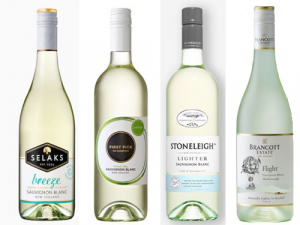NZ Sauvignon Blanc Defies Global Wine Decline
In a global wine market facing headwinds and overall decline, New Zealand Sauvignon Blanc continues to stand out as a remarkable success story.
 Six percent of all Sauvignon Blanc sold in New Zealand is lower in alcohol. These four are the top sellers.
Six percent of all Sauvignon Blanc sold in New Zealand is lower in alcohol. These four are the top sellers.
While New Zealand wine has always been innovative, it appears New Zealand consumers are also.
That’s the message from Richard Lee, Project Marketing Manager of the Lighter Wines PGP Programme, an initiative led by New Zealand Winegrowers with co-funding from the Ministry for Primary Industries’ Primary Growth Partnership.
Lee told the Bragato Conference that New Zealand is leading the world in terms of lighter in alcohol wine consumption.
“New Zealand is selling the highest proportion of lighter wine in the world, three percent of all wine now sold here is lighter in alcohol. That may not sound like much, but you have to remember that lighter wine is not competing in every segment. It is effectively just three key segments: Sauvignon Blanc, Pinot Gris and Rosé.”
Breaking down sales within each category, he said six percent of all Sauvignon Blanc sold in this country is lighter in alcohol. It is the same percentage in Pinot Gris, one of the ‘hot’ varietals in terms of overall sales growth. And in Rosé, eight percent of all wine sold, was lighter. That last figure is an important one, given Rosé is growing in popularity the world over. In New Zealand alone, sales of Rosé rose by 45 percent in 2016.
So domestic consumers are coming on board with lighter wines, but how does the rest of the world fare? Lee said quantitative consumer studies in Australia, UK, Sweden and Canada show that between 41 and 45 percent of premium consumers (those who would spend $15 or more on a bottle of wine) would be keen to purchase a lighter wine, so long as it was of equal flavour and quality. The reasons they weren’t following through with a purchase were because 1: Their preferred brand does not provide it as an option, 2: They can’t find it in a store, and 3: They are not even aware the products exist.
Which probably explains why in the four key markets surveyed, the sales of lighter wines made up just zero point six percent of all wine sales, compared to three percent in New Zealand.
If Australia was to match our domestic sales of lighter wine, it would create a market for another one million cases. In the UK it would be an increase of two point five million, Sweden half a million and Canada, just over one million. In total if each of those four markets had three percent sales of lighter wines, they would need a total of five million more cases to meet that demand. Now you can see why Lee gets so excited about the future potential.
It is not just New Zealand wine that is targeting lighter alcoholic beverages. Giants such as AB InBev, Heineken and Carlsberg are already targeting 25 percent of all beer sales being low or no alcohol by 2025.
So why the move? Simply put, Lee says, consumers are looking to moderate their alcohol intake on more occasions. In the case of wine though, they are not prepared to give up the thing they enjoy about wine - the quality and flavour. They don’t want a wine that has been artificially manipulated, Lee said, “they want a wine that is naturally lighter in alcohol, from a cooler climate country like New Zealand, because they know and trust they don’t have to give up the things we’re famous for – premium quality and flavour.”
That story resonates with retailers around the world, Lee said. “They get it and they also recognise there is a significant opportunity. We can help them with that to deliver on the potential.”
Jimmy Stewart is quite literally chipping away at circularity.
A Wine Marlborough Lifetime Achievement Award is “very premature”, say Kevin and Kimberley Judd, nearly 43 years after they came…
Wine tourism has evolved into a sophisticated, diverse and resilient part of the New Zealand wine sector's economy. Emma Jenkins MW talks…